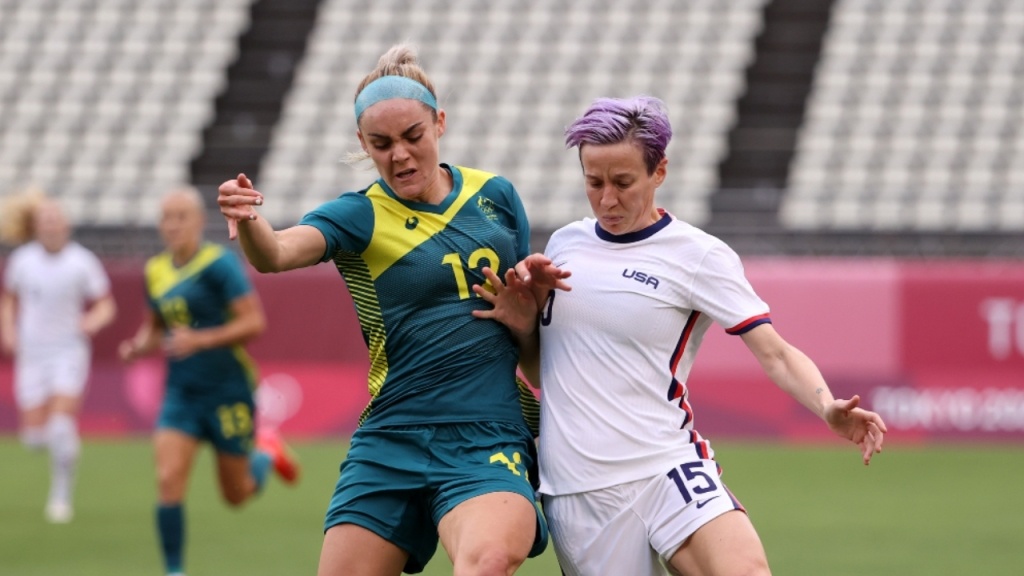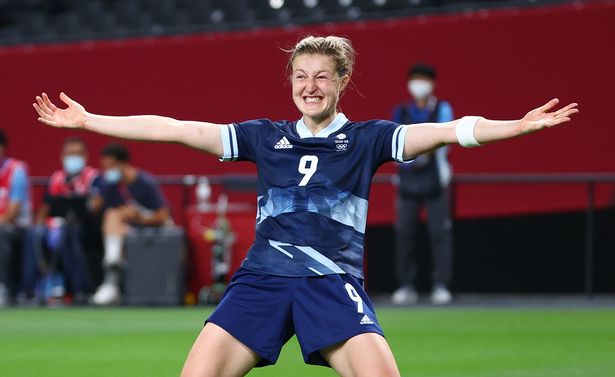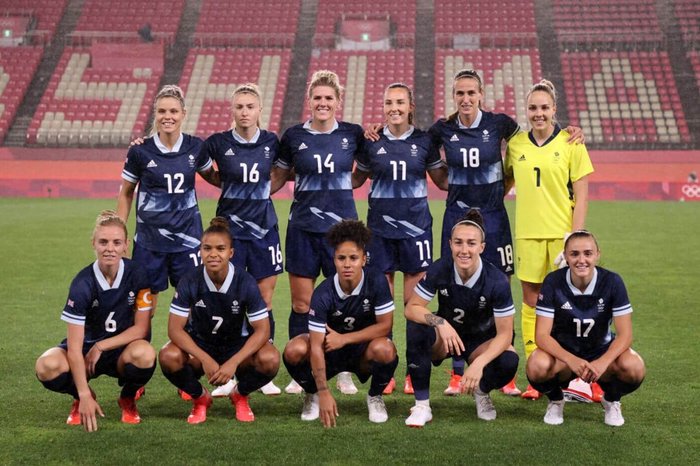
The Matildas’ 0-0 draw with the USA on Tuesday earned them a fascinating Quarter-Final tie with Great Britain, a match-up which could well usher in another long tension-filled last-eight clash of the like we saw last time round in Rio 2016 when Australia faced Brazil.
It will be a game between two sides who have experienced defensive issues in the recent past and have a wealth of attacking talent to unleash.
Looking back at the two sides’ most recent matches, Australia produced an example of professional game management within an overall well-organized team display to earn a point against a below-par USA in Kashima.
The defensive difficulties that have plagued Australia since they switched to a back three were largely absent in this game. Ellie Carpenter largely nullified the threat of USWNT icon Megan Rapinoe on the right with the Olympique Lyonnais defender constantly snapping at the American’s heels (pictured above via Getty Images).
There may be some critics who will attack the way the Matildas ended the game, but this was a case of tactics and for me Tony Gustavsson got it absolutely spot on. Australia were exceptionally well organized, strong defensively, and creative offensively. They went toe to toe with the World Champions – albeit a USA side who remain below their best – and played well.
Looking at the Matildas’ eight games under the Swede, there is a clear progression in performance. Things are still not quite where everyone would like to be but there are unquestionable positives.
Great Britain have had a solid tournament without quite hitting the heights that some may have expected.

Against Canada on Tuesday, they struggled to assert themselves going forward for much of the game against a well-organised Canadian defence. Whilst Georgia Stanway has been impressive creatively, there has been an overreliance on Ellen White to convert chances into goals. Therefore, the concern in Great Britain presently is, if you stop White, you prevent Team GB from scoring.
It is worth pointing out that Hege Riise’s team has been adversely impacted by an injury to Fran Kirby which meant the superstar up to now has only played the last 15 minutes of the game against Canada. If the Kirby that ripped up the FAWSL last season takes on the Matildas then it could be very different.
The Scottish duo of Kim Little and Caroline Weir have been outstanding in their creativity across the group games for Team GB, and the Matildas will need to focus on denying time and space to the pair.
Defensively, there remain major issues around the Great Britain side. Since the last World Cup, players who are outstanding for their club sides consistently make basic errors in an international shirt. Whilst originally this was felt by many England supporters to be a malaise linked to Phil Neville and a lack of organization at the back under his tenure, it has spread to Hege Riise’s watch and now to the Team GB side.
Those issues were apparent once more against Canada in the final group game. There had already been a warning light flashing on 53 minutes when Ellie Roebuck’s poor clearance went straight to Adriana Leon, whose shot was blocked by Millie Bright. Yet just two minutes later, Ashley Lawrence was given the freedom of Kashima to break up the left, cut in and square a ball which the entire British defence failed to reach. Leon was totally unmarked towards the back of the box and swept the ball home to score.
Whilst Roebuck is undoubtedly the number one goalkeeper in Great Britain and an outstanding shot-stopper, she is prone to making occasional poor clearances and also failing to claim the ball after coming for set-pieces. These are areas that the Matildas should target.

If Great Britain can be criticized for having an overreliance on Ellen White, it is only fair to mention Sam Kerr from the Australian perspective.
The USA did an excellent job in largely nullifying Kerr, limiting her time on the ball to the absolute minimum. This British side, containing Chelsea team-mates Millie Bright and Sophie Ingle know Kerr very well indeed and will be looking to repeat the defensive shutout.
This is where the Matildas need to be smart and utilise the creativity of Kyah Simon and also the pace of Ellie Carpenter to threaten the British backline. Pace and quick insightful passing amongst an Australian attack where positions are rapidly interchanged will provide the best chance of breaking through what at times is a ponderous British defence. Steph Catley’s teasing high corners have been a feature of these Olympics and they will certainly test Roebuck.
This encounter is one that both sides will feel they have a great chance of winning. It could come down to whose defence maintains its focus and organization, and whose attack is less reliant on their main striking star.






